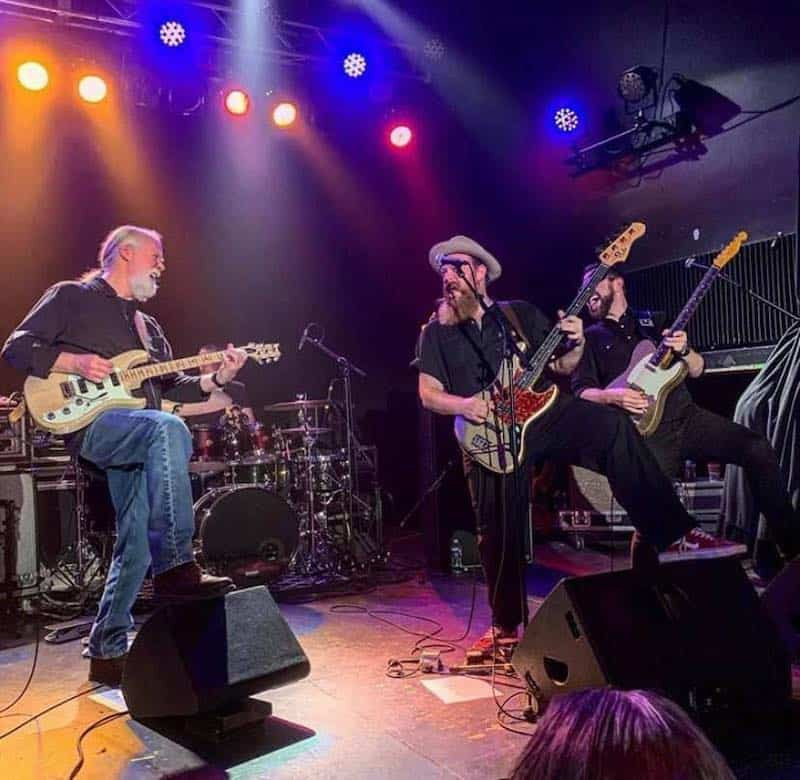Jimmy Herring, a name synonymous with exceptional guitar playing, has embarked on an exciting new musical journey. Known for his intricate fusion work and dynamic performances with bands like Widespread Panic and Aquarium Rescue Unit, Herring is now channeling his energy into a fresh project featuring some of Atlanta’s most talented musicians. This new venture allows Herring to explore different musical avenues, invigorated by the youthful exuberance and shared musical language of his bandmates.
Herring recounts the genesis of this band, explaining how his connection with the vibrant Atlanta music scene deepened through Kevin Scott, the bassist from his previous band that toured with John McLaughlin. Seeking to tap into the city’s pulse, Herring asked Scott to introduce him to noteworthy local players. Inspired by mentors like John McLaughlin and Phil Lesh who consistently collaborate with younger musicians, Herring felt it was time to infuse his music with a new generation’s energy. He notes, with a touch of humor, the shift in his role from the “young guy” to the seasoned veteran in the band dynamic.
This desire to collaborate led him to drummer Darren Stanley, a musician Herring admired and knew through their shared connection to Bruce Hampton. Hampton, the legendary founder of Aquarium Rescue Unit and a significant influence on Herring, served as a common thread among many of the musicians he considered. To round out the lineup, Herring sought a vocalist and guitarist who could navigate blues-based music while also venturing into more harmonically complex territories. Rick Lollar emerged as the ideal choice, recommended by Scott and known for his work with Matt Slocum in the band King Baby. Slocum, a keyboardist Herring had collaborated with for years and deeply respected, was also brought into the fold.
 Jimmy Herring performing with his guitar, showcasing his Whitwash band alongside other musicians.
Jimmy Herring performing with his guitar, showcasing his Whitwash band alongside other musicians.
The concept of a two-guitar lineup particularly appealed to Herring, who has always appreciated the interplay and sonic depth it offers. With Stanley, Lollar, Scott, and Slocum on board, the band began rehearsing without the immediate pressure of gigs. A fortunate connection provided them with a rehearsal space, allowing them to experiment and develop their sound organically. These initial sessions quickly revealed a strong musical chemistry and the potential for something significant. Original compositions began to emerge, alongside plans to incorporate Lollar’s material, King Baby songs, Herring’s instrumental pieces, and select covers. Lollar’s vocal talent and shared love for artists like Stevie Wonder and Donny Hathaway further solidified the band’s direction, blending instrumental prowess with soulful vocal elements. The collective enthusiasm to perform live led them to engage their manager and start booking dates, marking the formal launch of this exciting new band.
Despite the project’s momentum, Herring expresses a common musician’s lament: the desire for more time. The busy schedules of all band members, deeply embedded in Atlanta’s active music scene, presented logistical challenges. Coordinating rehearsals and writing sessions amidst commitments to other projects, including Herring’s own responsibilities with Widespread Panic, required careful juggling. He humorously describes the scheduling process as “insane,” highlighting the demand for these local Atlanta musicians.
Interestingly, the shared experience of working with Bruce Hampton became a recurring theme in Herring’s collaborations. He observes a sense of familial connection among musicians who have played with Hampton, even across different eras. This bond, rooted in Hampton’s unique musical philosophy and mentorship, transcends conventional musical training. Herring emphasizes that Hampton’s influence was less about specific techniques and more about fostering a mindset of musical freedom and selflessness – “how to get out of your own way and let it come through you.” This pursuit of uninhibited musical expression remains a guiding principle for Herring and his new band, promising performances that are both technically brilliant and deeply soulful.
